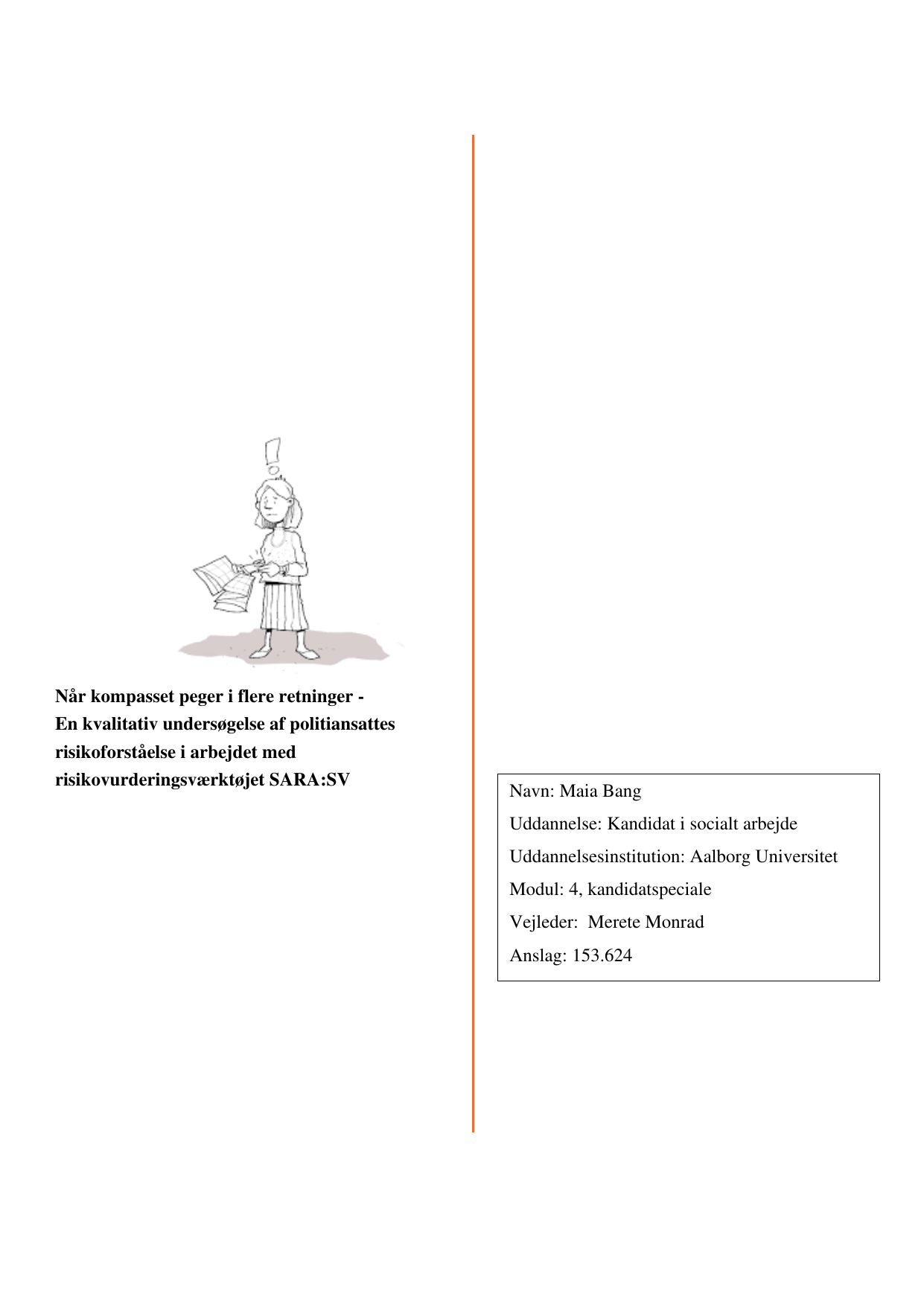
Når kompasset peger i flere retninger - En kvalitativ undersøgelse af politiansattes risikoforståelse i arbejdet med risikovurderingsværktøjet SARA:SV
Oversat titel
When the Compass Points in Several Directions - A Qualitative Study of Police Employees' Risk Perceptions in the Use of the Risk Assessment Tool SARA:SV
Forfatter
Semester
4. semester
Uddannelse
Udgivelsesår
2025
Afleveret
2025-05-26
Antal sider
74
Abstract
This thesis explores what shapes and influences police professionals’ risk assessments when using the structured professional judgment tool SARA:SV (Spousal Assault Risk Assessment – Short Version) in cases of intimate partner violence. Based on qualitative interviews with police employees from various professional backgrounds – including social workers, psychologists, and police officers – the study investigates how a specific risk level is determined and how professional discretion unfolds in practice. The analysis demonstrates that risk assessment is far from a neutral or purely technical activity. Rather, it is embedded in complex organizational structures and governance logics, where political and administrative expectations are translated into everyday practice through the tool as a form of governing technology. Professional judgment is shaped in interaction with colleagues, leadership, and institutional routines – rather than through isolated, linear reasoning. Under time constraints and in complex cases, practitioners act pragmatically and improvisationally in the tension between prevention goals and operational demands. The empirical data reveal significant variation in how identical information is interpreted and weighted. This highlights that risk assessment is not a mechanical or standardized process, but an active interpretive practice shaped by experience, norms, and professional rationales. Risk is constructed through this discretion – for instance, in the evaluation of the victim’s psychological presentation and perceived agency, which may lead to very different outcomes. Tacit knowledge and experience also play a crucial role in the selective gathering and interpretation of information. Assessments of the perpetrator are influenced not only by prior violence but also by normative assumptions about personality and intent. Similarly, interpretations of the victim’s behavior and vulnerability may result in pathologization or mistrust of their own risk perception. As the discussion highlights, these subjective elements can create blind spots – particularly when the perpetrator is not actively involved in the assessment. The relational encounter with both victims and perpetrators is central to how risk is understood. Despite SARA:SV’s ambition to provide objective structure, risk assessment emerges in practice as a sensory and emotional interaction, where trust, atmosphere, and professional intuition activate discretion and shape the final judgment. Many professionals view the risk scenarios in SARA:SV as the most problematic component – often perceived as artificial, frustrating, and disconnected from concrete case knowledge. In urgent situations, some choose to prioritize experience and intuition over scenario-based reasoning. This points to a fundamental tension between demands for standardization and the complexity of practice, where assessment is better understood as contextual judgment than as a linear process. Uncertainty also plays a central role. Limited information or lack of knowledge about the perpetrator can create professional blind spots, sometimes leading to elevated risk levels as a precaution, or to lower ones as a strategy to buy time. As the analysis and discussion demonstrate, risk assessment also operates as a way of managing organizational pressure, balancing objectivity with strategic concerns. In sum, the study shows that risk assessment with SARA:SV is a socially and institutionally situated practice. Professional discretion unfolds in a complex interplay of governance, experience, and relationships. The tool functions less as an automatic decision-maker and more as a framework that legitimizes an already activated professional evaluation.
Emneord
